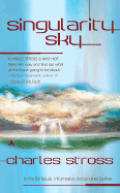
| Series: | Singularity Sky #1 |
| Publisher: | Ace |
| Copyright: | August 2003 |
| Printing: | July 2004 |
| ISBN: | 0-441-01179-9 |
| Format: | Mass market |
| Pages: | 337 |
I'm glad Stross is as prolific as he is, since I think I'm going to want to read a lot of his work. Singularity Sky is his first novel, and despite a few problems, it doesn't suffer from the difficulties of many first novels. He's starting off impressively well.
This is a space opera, although not solely so. There are spaceships and interstellar warfare, but the book is mostly about information warfare, about the impact of nanotechnology and a wide-open AI-driven information firehose on a suppressed and tightly controlled world. There's a healthy dose of political and economic satire too, pointed but not very preachy. Stross has a wonderfully surreal sense of humor and makes the most of the tricks one can pull with nanotech factories.
There was a sharp bang from the roof of the Corn Exchange, right at the climax of his impromptu speech; heads turned in alarm. Something had broken inside the spork factory, and stream of rainbow-hued plastic implements fountained towards the sky and clattered to the cobblestones on either side, like a harbinger of the postindustrial society to come. Workers and peasants alike stared in open-mouthed bewilderment at this astonishing display of productivity, then bent to scrabble in the muck for the brightly colored sporks of revolution.
The beginning of this book is great, introducing the amusing effects of the visit of the high-tech Festival to a backwater world and the subsequent wild collapse of the structure of society, the bumbling interstellar government that decides to fight it using conventional weapons, and two agents from Earth's anarchic libertarian societies that decide to get involved for very different reasons. I found both Rachel and Martin intriguing and liked the mystery about Martin's employer and the slow dance as they try to feel each other out while trying to figure out what's going on.
Unlike most first novels, Singularity Sky is well-paced, moving smoothly from scene to scene, weaving the occasional burst of information into the story at a point where it makes sense, covers something the reader was really curious about, and doesn't belabor the point. For a book with quite a bit of information to dump at the reader about everything from elaborate space factories to Marxist political bumbling, this is impressive.
The trouble comes towards the end of the book. Stross sets up a beautiful demonstration of the futility of a naive approach to technology, an example of how information and scientific discoveries change the whole nature of the game, but in the process sidelines the ability of his characters to actually affect the plot. As a result, things mostly just happen at the end of the book and the characters stand around and watch, which is anti-climatic and wastes some of the strength of the characters he's built. Martin also seemed to fall rather flat towards the end of the book, seeming much less competent than he had for the rest of the story. Stross needs to work some on his endings.
Despite the flaws, though, this book was just fun. I loved Stross's sense of humor and the universe background he put together is full of opportunities for both serious stories and social satire. I'm glad to see that he has written another book in the same universe; I want to see more of it. This ends up being more of an idea book than a strong character story, but recommended with that caveat.
Followed by Iron Sunrise.
Reviewed: 2005-04-28